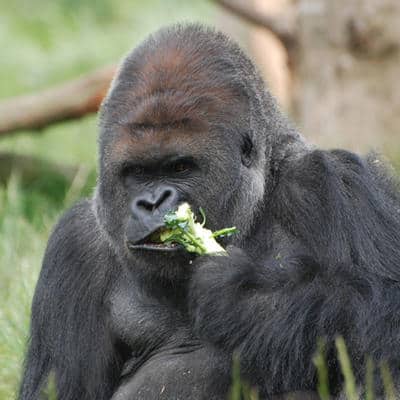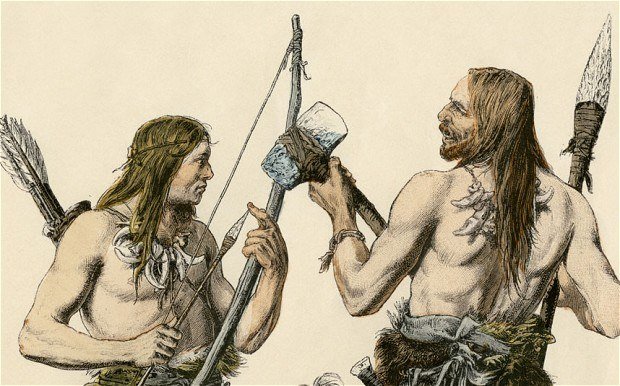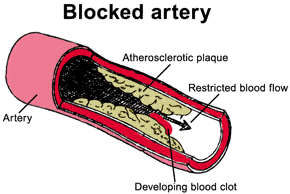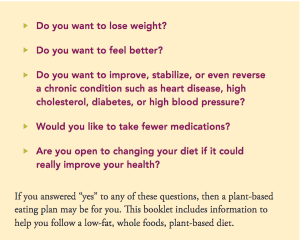Eat Like A Gorilla — Your Scientifically Proven Best Diet
Your scientifically proven best diet is the one your friendly neighborhood gorilla eats. No, not your hairy, shirtless neighbor, but the one in the zoo, or the few in the jungle. Eat like a gorilla and you’ll live longer and with more vitality and less chronic illness.
 Update: Scroll to the bottom and check out Arnold Schwarzenegger and a cast of veggie athletes in the film promo, The Game Changers.
Update: Scroll to the bottom and check out Arnold Schwarzenegger and a cast of veggie athletes in the film promo, The Game Changers.
BEFORE I delve into the “scientifically proven best diet”, I’d like to divulge a point of confusion.
I was recently making my way through Trader Joe’s, the grocery store I frequent, treading a well-worn path pass all the foodstuff I usually grab off the shelves and place in my cart. Then I stopped in front of the meat display and quickly entered some catatonic state where decision-making is illusive.
“What meat do I want to eat?” was the question whose answer I sought. These days that question often goes unanswered, and so it was. I turned away empty handed, pushing the cart ahead of me, muttering something about just not having an appetite for meat anymore and where in the heck am I gonna get the protein I need?
It’s easy to become confused.
If you spend a lot of time as I do reading the literature about nutrition, it’s inevitable that you bump into vigorous debates about the pros and cons of various foods, such as salt, saturated fats, coffee, red wine and meat. If in one corner there were a group of PhDs saying one thing and in the other corner a bunch of yahoos saying another, it would be easy to side with the experts.
But that’s not what you encounter.
No, instead of being able to defer to the experts who have been studying such things for decades, what you encounter are experts in both corners, each group deftly arguing for their perspective. And thus, you’ve got PhDs saying salt is good, and not; saturated fat is good, and not; coffee is good, and not; red wine is good, and not; and meat is good, and not.
What’s a poor layman to do?
Click here for my take on salt, saturated fats, red wine, coffee and meat.
OK, you asked for it.
If you can spare 20 minutes, read my article, What You Need To Know About Coffee, Saturated Fat and Meat.
If you can spare two minutes:
Salt: A little unadulterated sea or Himalayan salt is good, but beware of total salt intake if you eat a lot of fast, processed, packaged foods which often contain a lot of sodium.
Saturated Fat: This type of fat found in abundance in diary and meat can cause the accumulation of more cholesterol than is healthy, because unlike other meat-eating animals, such as dogs, wolves, bears and the like, humans do not easily clear ingested cholesterol; therefore it accumulates and can block arteries. Yes, we need cholesterol to do things like make hormones, but we don’t need a lot of it.
Coffee: Yes, it has antioxidants and the caffeine can charge you up for work and/or exercise, but drink too much of it and you can get jittery and addicted. If you find that after your xth cup, perspiration or nervousness happens, then you’ve drunk too much of it. If you find that you can’t begin your day without a cup and you get headaches without it, then you may be addicted to coffee. One cup is enough.
Red Wine: It too has antioxidants, as well as procyanidin flavonoids that have health benefits, but after one glass of red wine, the deleterious effects of alcohol begin to offset any health advantages. One glass is enough.
Meat: This article is about meat, so go read it. Spoiler alert – less is more.
Well, dear layman, I can tell you what I do. I minimize my consumption of salt, saturated fat, coffee, salt, red wine and meat. Speaking of meat, as mentioned, I’m observing my evolution away from it entirely.
Why? Read on…
In this article, you’ll discover:
- Why what gorilla’s eat are the scientifically proven best diet for you;
- How the real Paleo Diet is basically vegetarian;
- How our guts tell the tale; and
- What you can do to eat more plant-based food.
Why Dr. Michael Greger Eats Like A Gorilla
He and his ilk have done the research — the scientifically proven best diet is the one primates, like gorillas, eat. In his video, What Is The Healthiest Diet, Dr. Michael Greger speaks to the confusion many of us have about what is the healthiest diet, which is very interesting to me simply because despite our interest in knowing what’s best, it really doesn’t matter.
The reason knowing the best diet really doesn’t matter is because most of us won’t change what we eat even  if we knew, which, oddly, brings to mind Charlton Heston and his famous quote:
if we knew, which, oddly, brings to mind Charlton Heston and his famous quote:
“I’ll give you my gun when you pry it from my cold, dead hands”
Just substitute “gun” with “lamb chop” and you pretty much have the sentiment shared by many. And so I know that few of you will be moved to make much of a dietary change based on the information I’m about to channel via nutrition expert Michael Greger, MD. Nonetheless, just for kicks, I exhort you to keep reading and to watch a video or two, if only to see if you think that Dr. Greger’s tie matches his shirt.
First up is Dr. Greger’s video that pricks your understanding about the total value in food. For instance, if a food has one good thing in it but the rest of it has a lot to be desired, is it worth eating?
Some tout that cheese is good because of the calcium in it, and that meat is good because of its protein – but what about the other stuff that accompanies the nutrition in such foods, like the hormones in diary and the saturated fat in meat?
Dr. Greger makes the point that you can’t saunter up to the Burger King counter and request a burger without the saturated fat and cholesterol, because food is a “packaged deal”. Diary happens to be the number one source of calcium, but it’s also one of the highest sources of saturated fat.
That said, some packaged deals have a full package of goodness. Consider, for instance, the package deal you get with dark green leafy vegetables. In this case, in addition to the calcium, you get fiber, folate, iron, antioxidants — some of the very nutrients lacking in milk – and no saturated fat.
Plant foods average 64 times more antioxidants than animal foods. By getting most of your nutrition from whole plant foods, you get a big bonus, instead of heavy baggage.
Dr. Greger stresses that a plant-based diet can help you:
- Lose weight,
- Prevent and treat diabetes and heart disease,
- Lower blood pressure, and
- Live longer.
He and about 20 others on his staff review up to 200 nutritional studies every day. As of today, Greger’s website, NutritionFacts.org, has about 2,011 videos showing the research that underscores what your Grandma already told you:
“Eat your veggies!”
If you want to eat more healthily, watch what Dr. Greger has to say to Bob and Sally:
Click here and watch Dr. Greger’s video, How Not To Die.
Each year, Dr. Michael Greger gives a presentation that basically summarizes the research on nutrition that he and his team has evaluated over the course of that year. In 2016, the talk shares the same title of his recent book, How Not To Die.
How Not To Die: The Role of Diet in Preventing, Arresting, and Reversing Our Top 15 Killers
For those of you who would have no idea how to prepare meals not dominated by meat, I present to you The Whole Food Plant Based Cooking Show, one of many on Youtube. In the following video, Jill gets you started by reviewing the foodstuff she buys for about two weeks of meals:
(Check out Jill’s Youtube channel for cooking videos. There are additional resources listed below under “Your Takeaway”)
But What About Paleo? (No, it’s not the scientifically proven best diet)
Yes, the Paleo Diet is the rage these days. Depending on where you start health wise, you can get healthier by eating organic meats and dropping sugary carbs — at least in the short run — but if you’re aiming to be hale and fit for a very long time, Paleo may not be the way to go.
I respect several prominent Paleo-lovers, such as Dave Asprey, Chris Kresser, Mark Sisson and Robb Wolf who believe that the Paleo Diet is the best diet for humans because it’s the diet we evolved with prior to the agricultural age, they say. But, as you’ll see in the next video, Dr. Greger asks us to consider just what period of human evolution are we considering here?
Greger says that an influential article published in 1985 hypothesized that our chronic diseases stem from a disconnect between what our bodies evolved eating during the Stone Age as opposed to what we’re eating today. We’ve been evolving for 25 million years since our common great ape ancestor came on the scene. During that time our nutrient requirements and digestive physiology were set down, and therefore probably little affected by our hunter-gatherer days at the tail end, the last few hundred thousand years.
The pertinent question thus is:
What were we eating for the first 90% of our evolution?
Answer:
What the rest of the great apes were eating — over 95% plants.
This may explain why we humans are susceptible to heart disease.
Cholesterol may have been pretty much absent from the diet of our ancestors for most of human evolution. Back then, there was no bacon, butter, trans fats that can cause too much cholesterol to accumulate; moreover, there was massive amounts of fiber, which pulls cholesterol from the body. This situation would have been very problematic for your Great Grandpa (times 300+) if the humanoid body didn’t evolve to hold on to cholesterol, because we need a certain amount of it. That little bit of cholesterol that we got back in the day was preserved and recycled.
Can you see where this is heading?
If you want to know what happens when a species that is designed to hold onto cholesterol is given the modern era of bacon, eggs, cheese, chicken, pork and pastry, then look around and note that artery-clogging heart disease is our number one cause of death.
What used to be so adaptive for 90% of our evolution – holding on to cholesterol at all costs since we aren’t getting much in our diet – is maladaptive today, a liability leading to the clogging of our arteries. Our bodies just can’t handle it.
No matter how much fat and cholesterol carnivores eat, they do not develop atherosclerosis. You can feed a dog 500 eggs worth of cholesterol and a stick of butter and he’ll wag his tail and beg for more. A dog’s body evolved from wolves, and is used to eating and getting rid of excess cholesterol. Feed a fraction of that cholesterol to animals adapted to eating more of a plant-based diet and within months their arteries will begin clogging.
Well, you may be thinking,
Hey, Joe, you dig this evolution stuff and natural selection is a big part of that, so how come those Paleolithic people eating all that saturated fat and cholesterol didn’t die off, leaving only those with plaque-resistant genes to procreate, bestowing we modern people with this capability?
Glad you asked, Grasshopper.
The reason is simple: Back then nearly nobody lived long enough for clogged arteries to kill them and thus we didn’t have to evolve any protections against the ravages of chronic disease.
In the final analysis, dietary recommendations must be put to the test. That’s why the pioneering research of Nathan Pritikin, Dean Ornish, and Caldwell Esselstyn is so important. The life’s work of these brilliant men show that plant-based diets can not only stop heart disease, but have been proven to reverse it in the majority of patients. And that makes total sense, because it’s the only diet human kind had for most of its evolution.
Check out this video by Dr. Greger from which most of the above information was culled:
Click here for Greger's view on how Paleo may negate the benefits of exercise.
The slant in the video below is on how the benefits of exercise may be curtailed by a meat-heavy Paleo diet, particularly if you’re concerned about the so-called bad cholesterol, LDL.
So far, I’ve left the heavy lifting to Dr. Greger to support the proposition that a plant-dominated diet is healthier than one based on meat eating. Let’s give him an assist. An article called Human Ancestors Were Nearly All Vegetarian published in the Scientific American blog by Robb Dun can lend a hand.
Mr. Dun’s article is an entertaining and insightful read, particularly the part about how our guts and the bacteria therein evolved hand-in-glove with our diet. I chop the splendid article into the following bullet points with a heavy heart.
This is the meat of it:
- Our guts look like those of primates who are mostly herbivores, not lions who are carnivores. (He could have made a similar point about teeth.)
- Although it’s true that humans have recently evolved to be able to digest grains and milk, not everyone can do this well, although nearly everyone can digest fruits, nuts and veggies.
At this point the insatiably curious (and somewhat bored) among you are wondering if I wound up buying some meat at Trader Joe’s?
I actually did return to the meat section after getting all the usual stuff. Again I stared at it all, trying to conjure some appetite for meat. I told myself that I’m getting enough protein from various powders, like whey, pea, sprout and hemp protein, so I don’t want to increase the consumption of those. And I pondered whether I could handle more lentils and beans.
After a minute or two of that, I shrugged and went forthwith to the check out, sans meat. So, “your takeaway” is mine as well.
Your Takeaway
- Do as Michael Pollan advises, “Eat food. Not too much. Mostly plants.”
- To do #1, experiment with plant-based meals. Two great resources for this are:
- A booklet by Kaiser Permanente called The Plant-based Diet, and
- Matt Frazier’s No Meat Athlete Plant-Based Protein Grocery List, which he gives away if you subscribe to his blog.
- Any number of thousands of YouTube vegetarian cooking videos.
- To do #1 and #2, put aside any biases or conditioning. Keep your mind open. Remember that taste buds are malleable, and yours can be tuned to love non-meat meals.
The Benefits Offered by the Kaiser Booklet
Dr. Greger’s Book
So, what do you think?
Is a plant-based diet worth experimenting with?
Let us know in the Comments section below!
Last Updated on February 7, 2024 by Joe Garma








